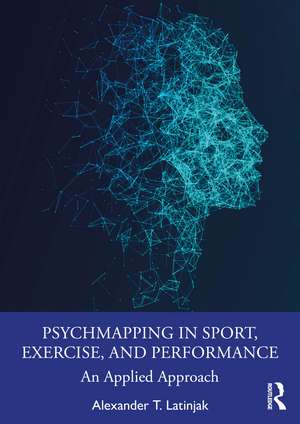PsychMapping in Sport, Exercise, and Performance: An Applied Approach
Autor Alexander T Latinjaken Limba Engleză Paperback – 12 noi 2024
The chapters follow the logic of the PsychMapping model, a map of all the key aspects in sport, exercise, and performance psychology. Each chapter is an opportunity for self-reflection and a perfect introduction for anyone interested in exploring the psychological aspects of human behaviour. Packed with practical experiences and real-world case studies, the book applies theories to life, making complex concepts accessible and actionable. A standout feature for professionals is the detailed self-reflection exercise, designed to enhance applied practice.
PsychMapping in Sport, Exercise, and Performance is enriching for students, practitioners, and anyone eager to explore the psychological aspects of human behaviour.
| Toate formatele și edițiile | Preț | Express |
|---|---|---|
| Paperback (1) | 304.08 lei 3-5 săpt. | +23.39 lei 7-13 zile |
| Taylor & Francis – 12 noi 2024 | 304.08 lei 3-5 săpt. | +23.39 lei 7-13 zile |
| Hardback (1) | 1007.23 lei 6-8 săpt. | |
| Taylor & Francis – 12 noi 2024 | 1007.23 lei 6-8 săpt. |
Preț: 304.08 lei
Nou
Puncte Express: 456
Preț estimativ în valută:
58.18€ • 60.75$ • 48.16£
58.18€ • 60.75$ • 48.16£
Carte disponibilă
Livrare economică 15-29 martie
Livrare express 01-07 martie pentru 33.38 lei
Preluare comenzi: 021 569.72.76
Specificații
ISBN-13: 9781032592541
ISBN-10: 1032592540
Pagini: 286
Ilustrații: 118
Dimensiuni: 174 x 246 x 18 mm
Greutate: 0.47 kg
Ediția:1
Editura: Taylor & Francis
Colecția Routledge
Locul publicării:Oxford, United Kingdom
ISBN-10: 1032592540
Pagini: 286
Ilustrații: 118
Dimensiuni: 174 x 246 x 18 mm
Greutate: 0.47 kg
Ediția:1
Editura: Taylor & Francis
Colecția Routledge
Locul publicării:Oxford, United Kingdom
Public țintă
Academic, General, Professional, and UndergraduateNotă biografică
Alexander T. Latinjak is an Associate Professor of Sport and Exercise Psychology at the University of Suffolk, UK and the founder of the PsychMapping movement. A prominent figure in the scientific community, he publishes regularly in leading specialist journals and serves on the editorial boards of various academic publications. With over 20 years of applied experience, Alexander has worked extensively in talent development and elite-level environments, bringing practical insights to his research and teaching.
Cuprins
PART I
The PsychMapping perspective
1 PsychMapping and sport, exercise, and performance psychology
PART II
What are people made of?
2 Descriptive traits: Who the heck are you?
3 Descriptive states: What on earth is the matter with you today?
4 The relation between descriptive states and traits: That experience totally changed me!
5 The externalized self: Behaviour, performance, and environmental interaction
Case 1 Self-reflexion exercises to understand clients’ identity and experiences
PART III
All that what surrounds people
6 External factors: There is always something or someone to blame!
7 Interpersonal PsychMapping model: From individual focus to collective insight
Case 2 A team mapping analysis based on the interpersonal PsychMapping model
PART IV
The major processes that shape us
8 External perception: It’s not you, it’s me
9 Self-regulation: Get your act together!
Case 3 Building self-knowledge, improving self-regulation
PART V
Applied practice
10 Indirect interventions: You might never know what I have done for you
11 Working with individuals: So much more than interventions
PART VI
The basic PsychMapping exercise
12 The PsychMapping exercise: Not really an interview guide
13 The PsychMapping exercise construction manual
14 Analysis: Don’t take this the wrong way
The PsychMapping perspective
1 PsychMapping and sport, exercise, and performance psychology
PART II
What are people made of?
2 Descriptive traits: Who the heck are you?
3 Descriptive states: What on earth is the matter with you today?
4 The relation between descriptive states and traits: That experience totally changed me!
5 The externalized self: Behaviour, performance, and environmental interaction
Case 1 Self-reflexion exercises to understand clients’ identity and experiences
PART III
All that what surrounds people
6 External factors: There is always something or someone to blame!
7 Interpersonal PsychMapping model: From individual focus to collective insight
Case 2 A team mapping analysis based on the interpersonal PsychMapping model
PART IV
The major processes that shape us
8 External perception: It’s not you, it’s me
9 Self-regulation: Get your act together!
Case 3 Building self-knowledge, improving self-regulation
PART V
Applied practice
10 Indirect interventions: You might never know what I have done for you
11 Working with individuals: So much more than interventions
PART VI
The basic PsychMapping exercise
12 The PsychMapping exercise: Not really an interview guide
13 The PsychMapping exercise construction manual
14 Analysis: Don’t take this the wrong way
Descriere
This book introduces PsychMapping, a unique model that visually and philosophically guides readers through the complexities of human behaviour. The holistic approach reveals how different psychological aspects interact and influence each other.
